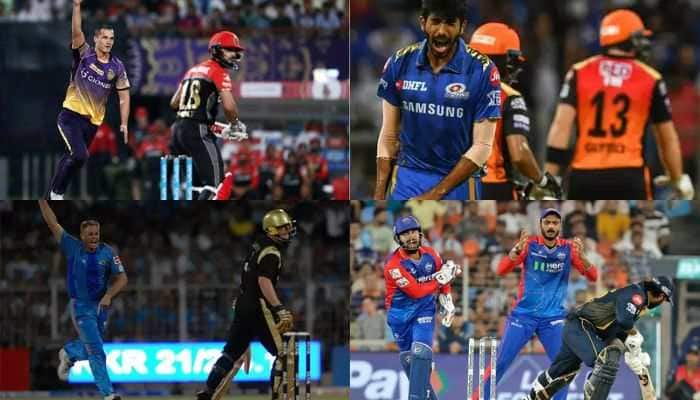Champions Trophy: A Zeecric round-up
The Champions Trophy, brainchild of the then ICC President Jagmohan Dalmiya, was launched with dual objectives of spreading the game to emerging nations as well as to raise moolah for the ICC in between the World Cups.
Trending Photos
)
 Pratik Dogra
The Champions Trophy, brainchild of the then ICC President Jagmohan Dalmiya, was launched with dual objectives of spreading the game to emerging nations as well as to raise moolah for the ICC in between the World Cups.
Dubbed as the mini World Cup, the previous editions of this 2-yearly extravaganza have had their share of thrills and excitement. The present edition was initially scheduled to be held in Pakistan in 2008, but owing to security concerns of many participating teams, the ICC decided to shift the event to South Africa.
As the sixth edition of ICC Champions Trophy gets underway, it is also a make or break time for the one-dayers. With doomsayers forecasting a demise of what was once the most followed and the most marketable product, it is suddenly a ‘now or never’ situation for the 50-over format viz-a-viz its future in face of competition from other formats, most prominently Twenty20.
With so much riding on the impending 8-nation tourney, the stage is set for a fortnight of some high-voltage, adrenaline pumping cricket action in South Africa.
We at Zeecric go down the memory lane and relive some of the riveting action as well as the evolution of Champions Trophy into a premier cricketing contest.
Year: 1998
Venue: Dhaka, Bangladesh
Winner: South Africa
Runners-up: West Indies
Participants: 9
This 9-team event (hosts Bangladesh were excluded) comprised 8 matches played over 9 days and was played on a knock-out theme. New Zealand beat Zimbabwe in a pre-qualifier to earn the right to play then World Champions Sri Lanka in the quarterfinals. India, South Africa, Sri Lanka and West Indies romped into the semi-finals with victories over Australia, England, New Zealand and Pakistan respectively.
The semi-finals saw mouth-watering line-ups between India-West Indies and Sri Lanka- South Africa.
South Africa and West Indies emerged victorious to set up a final showdown where despite Phil Wallace’s 102 ball 103, former had the last laugh.
The 1998 Champions Trophy remains South Africa’s only ICC silverware till date.
The chief highlights of the 1998 edition remain the explosive starts delivered by the West Indies’ opener Phil Wallace and the enthusiastic response from locals who flocked the stadiums for all the matches despite the fact that Bangladesh wasn’t a party to the event.
India’s Performance
Riding on Sachin Tendulkar’s all-round performance, 141 runs with the bat and 4-wickets, India knocked Australia out with a 44-run victory in the quarter-finals.
India however failed to carry the momentum into the semi-finals against the unpredictable West Indians. Despite a fluent 83 from Sourav Ganguly and a fighting 73 not out from Robin Singh, India went down rather tamely to the West Indies, losing by 6 wickets.
Year: 2000
Venue: Nairobi, Kenya
Winner: New Zealand
Runners-up: India
Participants: 11
The second edition, held in the Kenyan capital, saw the participation of Bangladesh as well as the host nation, besides the 9-Test playing nations.
The first major tourney in the aftermath of the match-fixing scandal that had rocked the cricketing world earlier that year, it was a knock-out tournament as well.
West Indies, Kenya and Bangladesh were expectedly weeded out in the pre-qualifiers as the tournament moved into the second round.
India repeated their 1998 success against Australia, much to the shock of the World Champions, while Pakistan, South Africa and New Zealand rounded off expected victories over Sri Lanka, England and Zimbabwe.
Indian juggernaut rolled over the mighty South Africans in the semi-finals while the Kiwis usurped the Pakistanis to march into the finals.
India and New Zealand were two teams least expected to make this far. Riding on Chris Cairns individual brilliance (he smashed an unbeaten century), New Zealand rallied to beat India by 4 wickets in a thrilling final, and like South Africa 2 years ago, break their ICC silverware drought with a Champions Trophy.
India’s Performance
With the inspirational Sourav Ganguly at helm, a young Indian side, still reeling from losing heavyweights like Mohammad Azharuddin and Ajay Jadeja to match-fixing, made a quiet start to the tournament, overcoming Kenya with a solid all-round performance.
Australia beckoned next and not many gave the inexperienced Indians much of a chance against the indomitable World Champions. It was then that a young 19-year old by the name of Yuvraj Singh exploded spectacularly, with the bat first, and the then in the field (3 outstanding catches) to implode the mighty Aussies and send them packing.
In the semi-finals Sourav Ganguly took it upon himself to tear apart the South Africans, dispatching the like of Donalds and Pollocks to all parts of the ground for a violent 141 and propelled India into the finals.
India seemed to be continuing in the same vein as Sachin Tendulkar and Ganguly put on a great show for the first wicket in 20 overs. The middle-order however failed to sustain the momentum and even though Ganguly (117 runs) managed his second ton on the trot, India could manage only 264 runs from 50 overs.
In the field, even though India had their chances, Chris Crains, batting with a sore knee, struck an unbeaten 103 to pour cold water on Team India’s aspirations.
Year: 2002
Venue: Colombo, Sri Lanka
Winner (s): India, Sri Lanka
Runners-up:
Participants: 12
The tourney lasted 18 days and consisted of 17 matches, but had no single winner! The rain Gods, having stayed for the entire duration of the tournament made an unwanted appearance just as the final between India and hosts Sri Lanka was gathering steam. India was 14/0 chasing Sri Lanka’s 244/5 when the match was abandoned. It was decided to have a replay the following day.
The next day however produced a similar story. Having done the hard work by restricting Sri Lanka to 222/7 from 50 overs, Indians were cruelly denied in their victory bid as rain stopped play when India was 38/1 in the ninth over.
As per the tournament rules, India and Sri Lanka were declared joint winners.
The ICC Champions Trophy was being held in a Test playing nation for the first time. The ICC also decided to do away with the knock-out format, instead opting to divide the 12 teams into 4 groups with the toppers clinching a spot in the semis.
Sri Lanka clashed with Australia in the semis while India took on South Africa. The Asians triumphed, but while for the hosts it was a convincing victory, India had to dig deep into their recourses to clinch a thrilling 10-run win over the Proteas.
India’s performance
The nucleus of the Indian time was the same as the young side of 2000, the only difference 2 years later was that it had matured considerably.
Mohammad Kaif slammed his maiden century as India hung on for a 14-run victory over Zimbabwe in their first match. With both, bat (87/5) and in the field (Andy Flower smashed 145 runs), India seemed to be in a spot of bother, but the newly instilled self-belief, courtesy Ganguly, saw them through.
England were up next in what was a must win game for both sides in order to progress to the semis. A solid batting display helped England to a competitive 269/7 from 50 overs, a total which on any other day or against any other opposition, would have seen them through to semis.
But it was not any other day….nor was India just any other opposition. What followed was destruction. Making a complete mockery of England’s bowling, openers Virender Sehwag and Sourav Ganguly ensued such plunder that India romped past the victory target in just 40 overs! Experts were left astounded as Sehwag (126) and Ganguly (117 not out) made a brazenly loud display of India’s batting prowess.
Against South Africa in the semis, it was Sehwag’s turn to spell magic with the ball.
In reply to India’s 261/9, South Africa seemed to be coasting to victory at 192/1 in the 38th over, needing runs at less than 6 per over. It was then that things began to roll in India’s favour as Herschelle Gibbs, on 116, suffered cramps and decided to retire hurt. What followed in the next 12 overs was a complete strangulation of the South African middle-order by India’s slow bowlers, led by Sehwag (3/25). South Africans choked so comprehensively, managing just 59 runs in those 12 overs to go down by 10 runs.
Only gods, it seemed, could have stopped the Indian juggernaut, and as it turned, it were the rain gods who halted India’s charge.
As Ganguly and Jayasuriya shared the trophy, the wide grin on the latter’s place showed clearly who managed the better of exchanges.
Pratik Dogra
The Champions Trophy, brainchild of the then ICC President Jagmohan Dalmiya, was launched with dual objectives of spreading the game to emerging nations as well as to raise moolah for the ICC in between the World Cups.
Dubbed as the mini World Cup, the previous editions of this 2-yearly extravaganza have had their share of thrills and excitement. The present edition was initially scheduled to be held in Pakistan in 2008, but owing to security concerns of many participating teams, the ICC decided to shift the event to South Africa.
As the sixth edition of ICC Champions Trophy gets underway, it is also a make or break time for the one-dayers. With doomsayers forecasting a demise of what was once the most followed and the most marketable product, it is suddenly a ‘now or never’ situation for the 50-over format viz-a-viz its future in face of competition from other formats, most prominently Twenty20.
With so much riding on the impending 8-nation tourney, the stage is set for a fortnight of some high-voltage, adrenaline pumping cricket action in South Africa.
We at Zeecric go down the memory lane and relive some of the riveting action as well as the evolution of Champions Trophy into a premier cricketing contest.
Year: 1998
Venue: Dhaka, Bangladesh
Winner: South Africa
Runners-up: West Indies
Participants: 9
This 9-team event (hosts Bangladesh were excluded) comprised 8 matches played over 9 days and was played on a knock-out theme. New Zealand beat Zimbabwe in a pre-qualifier to earn the right to play then World Champions Sri Lanka in the quarterfinals. India, South Africa, Sri Lanka and West Indies romped into the semi-finals with victories over Australia, England, New Zealand and Pakistan respectively.
The semi-finals saw mouth-watering line-ups between India-West Indies and Sri Lanka- South Africa.
South Africa and West Indies emerged victorious to set up a final showdown where despite Phil Wallace’s 102 ball 103, former had the last laugh.
The 1998 Champions Trophy remains South Africa’s only ICC silverware till date.
The chief highlights of the 1998 edition remain the explosive starts delivered by the West Indies’ opener Phil Wallace and the enthusiastic response from locals who flocked the stadiums for all the matches despite the fact that Bangladesh wasn’t a party to the event.
India’s Performance
Riding on Sachin Tendulkar’s all-round performance, 141 runs with the bat and 4-wickets, India knocked Australia out with a 44-run victory in the quarter-finals.
India however failed to carry the momentum into the semi-finals against the unpredictable West Indians. Despite a fluent 83 from Sourav Ganguly and a fighting 73 not out from Robin Singh, India went down rather tamely to the West Indies, losing by 6 wickets.
Year: 2000
Venue: Nairobi, Kenya
Winner: New Zealand
Runners-up: India
Participants: 11
The second edition, held in the Kenyan capital, saw the participation of Bangladesh as well as the host nation, besides the 9-Test playing nations.
The first major tourney in the aftermath of the match-fixing scandal that had rocked the cricketing world earlier that year, it was a knock-out tournament as well.
West Indies, Kenya and Bangladesh were expectedly weeded out in the pre-qualifiers as the tournament moved into the second round.
India repeated their 1998 success against Australia, much to the shock of the World Champions, while Pakistan, South Africa and New Zealand rounded off expected victories over Sri Lanka, England and Zimbabwe.
Indian juggernaut rolled over the mighty South Africans in the semi-finals while the Kiwis usurped the Pakistanis to march into the finals.
India and New Zealand were two teams least expected to make this far. Riding on Chris Cairns individual brilliance (he smashed an unbeaten century), New Zealand rallied to beat India by 4 wickets in a thrilling final, and like South Africa 2 years ago, break their ICC silverware drought with a Champions Trophy.
India’s Performance
With the inspirational Sourav Ganguly at helm, a young Indian side, still reeling from losing heavyweights like Mohammad Azharuddin and Ajay Jadeja to match-fixing, made a quiet start to the tournament, overcoming Kenya with a solid all-round performance.
Australia beckoned next and not many gave the inexperienced Indians much of a chance against the indomitable World Champions. It was then that a young 19-year old by the name of Yuvraj Singh exploded spectacularly, with the bat first, and the then in the field (3 outstanding catches) to implode the mighty Aussies and send them packing.
In the semi-finals Sourav Ganguly took it upon himself to tear apart the South Africans, dispatching the like of Donalds and Pollocks to all parts of the ground for a violent 141 and propelled India into the finals.
India seemed to be continuing in the same vein as Sachin Tendulkar and Ganguly put on a great show for the first wicket in 20 overs. The middle-order however failed to sustain the momentum and even though Ganguly (117 runs) managed his second ton on the trot, India could manage only 264 runs from 50 overs.
In the field, even though India had their chances, Chris Crains, batting with a sore knee, struck an unbeaten 103 to pour cold water on Team India’s aspirations.
Year: 2002
Venue: Colombo, Sri Lanka
Winner (s): India, Sri Lanka
Runners-up:
Participants: 12
The tourney lasted 18 days and consisted of 17 matches, but had no single winner! The rain Gods, having stayed for the entire duration of the tournament made an unwanted appearance just as the final between India and hosts Sri Lanka was gathering steam. India was 14/0 chasing Sri Lanka’s 244/5 when the match was abandoned. It was decided to have a replay the following day.
The next day however produced a similar story. Having done the hard work by restricting Sri Lanka to 222/7 from 50 overs, Indians were cruelly denied in their victory bid as rain stopped play when India was 38/1 in the ninth over.
As per the tournament rules, India and Sri Lanka were declared joint winners.
The ICC Champions Trophy was being held in a Test playing nation for the first time. The ICC also decided to do away with the knock-out format, instead opting to divide the 12 teams into 4 groups with the toppers clinching a spot in the semis.
Sri Lanka clashed with Australia in the semis while India took on South Africa. The Asians triumphed, but while for the hosts it was a convincing victory, India had to dig deep into their recourses to clinch a thrilling 10-run win over the Proteas.
India’s performance
The nucleus of the Indian time was the same as the young side of 2000, the only difference 2 years later was that it had matured considerably.
Mohammad Kaif slammed his maiden century as India hung on for a 14-run victory over Zimbabwe in their first match. With both, bat (87/5) and in the field (Andy Flower smashed 145 runs), India seemed to be in a spot of bother, but the newly instilled self-belief, courtesy Ganguly, saw them through.
England were up next in what was a must win game for both sides in order to progress to the semis. A solid batting display helped England to a competitive 269/7 from 50 overs, a total which on any other day or against any other opposition, would have seen them through to semis.
But it was not any other day….nor was India just any other opposition. What followed was destruction. Making a complete mockery of England’s bowling, openers Virender Sehwag and Sourav Ganguly ensued such plunder that India romped past the victory target in just 40 overs! Experts were left astounded as Sehwag (126) and Ganguly (117 not out) made a brazenly loud display of India’s batting prowess.
Against South Africa in the semis, it was Sehwag’s turn to spell magic with the ball.
In reply to India’s 261/9, South Africa seemed to be coasting to victory at 192/1 in the 38th over, needing runs at less than 6 per over. It was then that things began to roll in India’s favour as Herschelle Gibbs, on 116, suffered cramps and decided to retire hurt. What followed in the next 12 overs was a complete strangulation of the South African middle-order by India’s slow bowlers, led by Sehwag (3/25). South Africans choked so comprehensively, managing just 59 runs in those 12 overs to go down by 10 runs.
Only gods, it seemed, could have stopped the Indian juggernaut, and as it turned, it were the rain gods who halted India’s charge.
As Ganguly and Jayasuriya shared the trophy, the wide grin on the latter’s place showed clearly who managed the better of exchanges. 






)
)
)
)
)
)
)
)
)
)
